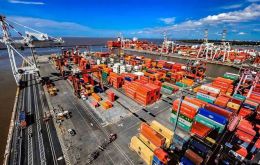MercoPress. South Atlantic News Agency
Economy
-
Saturday, September 20th 2025 - 10:32 UTC
IMF mission praises Uruguay's economy

The International Monetary Fund (IMF) has completed its annual review of the Uruguayan economy, praising its resilience and stability.
-
Saturday, September 20th 2025 - 01:05 UTC
Green hydrogen project in Uruguay not quite environmentally friendly

A green hydrogen production plant planned for Uruguay by the company HIF has been classified as having a “significant negative environmental impact” by the South American country's Environment Ministry, due to which the initiative, at an estimated investment of US$6 billion, faces several challenges.
-
Friday, September 19th 2025 - 21:38 UTC
UK after closer trade ties with Argentina and Brazil, South America’s largest economies

Newly appointed Trade Minister Chris Bryant is visiting Brazil and Argentina, South America’s largest economies, to champion British business and closer trade ties. As part of the Trade Strategy’s plan to focus on practical deals that deliver faster benefits for businesses, Minister Bryant will progress several targeted partnerships with Brazil, including on customs, good regulatory practices, and export credit.
-
Friday, September 19th 2025 - 10:55 UTC
Falklands’ successful trade, energy and business mission to Chile

A Falkland Islands business delegation has just returned from a week in Chile, where they explored opportunities in sustainable energy, innovation and connections between the two countries.
-
Friday, September 19th 2025 - 10:46 UTC
Noboa declares curfew in five of Ecuador's provinces

Ecuador's President Daniel Noboa has declared a curfew in five provinces and extended the state of emergency to an eighth province. These measures were adopted in response to planned protests over the elimination of a diesel subsidy, resulting in a rise from US$1.80 to US$2.80 per gallon, sparking outrage among transport workers and other social sectors.
-
Friday, September 19th 2025 - 10:22 UTC
Dollar soars amid Argentina's political instability

Argentina's Economy Minister Luis Toto Caputo announced on Thursday that the government would sell “every last dollar” to defend the current parity between the Argentine peso and the greenback. He made those remarks following a rise in the official quotation, which pierced the upper limit of its exchange rate band. Caputo insisted this approach fell within the program agreed upon with the International Monetary Fund (IMF).
-
Friday, September 19th 2025 - 09:37 UTC
Argentina records 21st straight trade surplus

Argentina's trade surplus last month was US$1.402 billion, which was way higher than expectations. According to the National Institute of Statistics and Censuses (Indec), this marks the 21st consecutive month of a trade surplus for the country.
-
Friday, September 19th 2025 - 03:49 UTC
Brazilian inflation in August drops slightly but remains above target

Brazil’s official consumer inflation index (IPCA) fell 0.11% in August, the Brazilian Institute of Geography and Statistics (IBGE) reported last week. This was the first negative reading since August 2024 and the sharpest drop since September 2022, when inflation fell 0.29%.
-
Thursday, September 18th 2025 - 13:50 UTC
UK Trade Minister visiting Brazil and Argentina

As the UK seeks agreements to make it easier and cheaper for British businesses to export, newly appointed Trade Minister Chris Bryant is visiting Brazil and Argentina on Thursday to achieve those goals.
-
Wednesday, September 17th 2025 - 10:45 UTC
Sharp fall in unemployment reported in Brazil

A report released Tuesday by Brazil's Institute of Geography and Statistics (IBGE) showed a significant drop in the unemployment rate in the quarter ending in July, which stood at 5.6%, the lowest since records began in 2012. In the previous rolling quarter, the rate was 5.8%.
